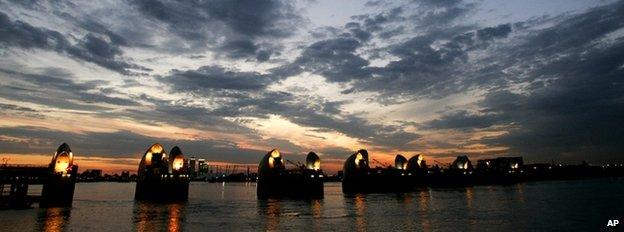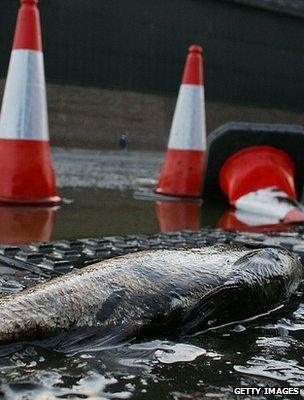Studies offer cities advice on tackling climate risks
- Published

The researchers hope the studies will help cities increase their resilience to climate change
Urban areas need to build in additional capacity to adapt to the range of threats posed by climate change, research has shown.
Risks such as flooding and excessive temperatures are among the risks facing towns and cities, experts conclude.
Two separate studies by the University of Manchester and the European Environment Agency said city planners had to act now to build in resilience.
More than half of the world's population now live in urban areas.
On Monday, researchers from the University of Manchester and property company Bruntwood hosted a seminar to outline findings from the EcoCities project.
"Different cities face different challenges in terms of the hazards they are facing," said Jeremy Carter, lead researcher for the project.
"For example, some will face issues like sea-level rise, while others water management problems," he told BBC News.
Dr Carter added that cities where already experiencing changes to the climate, making it more important for policymakers to look at ways to "climate proof" urban areas.
"It is about building in resilience that relates to current climate extremes. By preparing for current risks, you are actually building capacity for the future."
He said the project had identified three key priorities:
Safeguarding future prosperity,
protecting the most vulnerable communities,
Build resilience into the urban infrastructure.
Michael Oglesby, chairman of Bruntwood, said that businesses had a "strong imperative to tackle climate adaptation, and to do so before it is too late".
"There is a very real danger that we will spend a large amount of time and money on legislation ensuring that all new buildings comply to the very highest standards, whilst forgetting that at least 80% of the buildings that make up our city today will still be in active use in 2050 and urgently require major adaptation work carried out on them if they are still to be usable then."
<bold>Climate for change</bold>
The European Environment Agency (EEA) also published a report on the challenges and opportunities facing urban areas as a result of climate change.

Urban flooding is projected to become more frequent in the future
The authors warned that projected climate scenarios presented a number of threats, including flooding, risks to economic activity and public health, and undermining infrastructures like energy and transport.
"What we are trying to do is to get city managers to anticipate that they will need much quicker event planning, and there are already things that they can anticipate," said Jacqueline McGlade, EEA executive director.
"This is where political leadership is very important - if you have a vision, and understanding that climate change and adaptation is part-and-parcel of running a city today, it is not something you can renege on," she told BBC News.
Prof McGlade said one proven climate adaptation technique was to add greenery to buildings and public areas, and had been shown to reduce the "urban heat island" effect by up to 10C (18F).
"It has become an instrument to help mitigate against premature deaths, so if there was ever a time to start thinking about putting greenery into cities, it is extremely clear that they pay off," she explained.
"The cost of inaction is very quickly outweighed by the benefits of doing simple things like this."
- Published7 April 2011